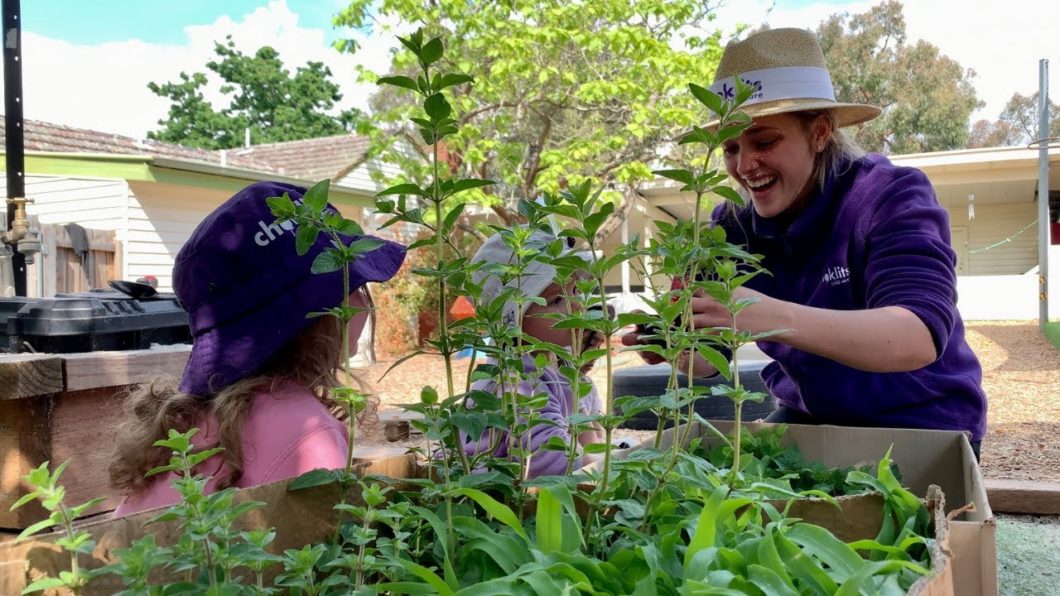Australia is home to a diverse range of beautiful environments, from picturesque beaches to lush rainforests to sweltering deserts to windswept coastlines to undisturbed bushland. We are lucky to have nature’s rich, captivating playground on our doorstep, and here at Choklits Child Care Centre, we believe in capitalising on the opportunity it provides to support children’s learning and development.
Engaging with nature is beneficial to children’s developing minds for a multitude of reasons, as learning outdoors helps to foster positive relationships with their peers and the environment. Engaging students in active, practical and interesting learning experiences in natural outdoor settings promotes the development of their knowledge, understanding and skills to interact safely and respectfully with the environment, laying the foundation for a connected and sustainable future. The connection with their peers and the environment that learning outdoors provides children is incredibly valuable for their personal wellbeing, and the sustainability of our society and our environment.
In this blog, were going to delve into why engaging with nature is beneficial for children through discussing the value and importance of outdoor learning for developing minds.
Why is Learning Outdoors Important for Children?
Learning outdoors by spending time in a natural environment and making use of natural materials provides opportunities for children to explore their world and let their curiosity run free. The inherent qualities of the outdoors support creativity and encourage the development and implementation of problem solving skills, concurrently furthering children’s social development, particularly in the areas of teamwork, communication and cooperation.
Having practiced skills in these areas also aids kindergarten age children in their early literacy and numeracy development as it improves their coordination, persistence and ability to focus, all of which are essential life skills. Additionally, learning outdoors aids children in developing their emotional regulation capacity, as it reduces stress levels and increases happiness, supporting a calm, positive baseline from which confidence in dealing with more difficult emotions can be built.
Spending more time outside in nature allows children to form a stronger connection with the environment, which sponsors their enjoyment of outdoor recreation and their interest in the natural environment. This relationship is a key foundation in their continual enjoyment of outdoor activities and experiences that involve nature, which improves personal health and wellbeing. Furthermore, the robust connection with the environment that learning outdoors fosters is the first step in developing children’s ecological literacy, which is about the knowledge, empathy, and action required for sustainable living.
What are the Benefits of Learning Outdoors?
Learning outdoors has a host of positive impacts on children’s social and academic learning, and their physical and emotional health. First and foremost, children have a natural affinity for being outside, as it stimulates their senses and provides a multidimensional learning experience, making it exciting and engaging. Hence, spending more time outside translates to increased enjoyment of learning and builds their motivation, both of which are instrumental factors in children reaching their educational goals, whether that be learning to build a sandcastle as a toddler, write their name in prep or do times tables in year four.
A relaxed and happy state is conducive to better learning and building positive relationships with peers, which is another benefit of leaning outdoors. Having strong relationships with other children helps to build social skills and collaboration, furthering their resilience and capacity to work cooperatively and autonomously. This teaches children about independence and interdependence, and supports the development of foundational leadership skills. Furthermore, as learning outdoors often involves activities that are challenging and interesting, it builds essential personal and social capabilities like self-confidence, teamwork and initiative.
The adventurous nature of the outdoors leads us to another facet of the unique benefits of learning in a natural environment; developing a healthy respect for the Australian environment. During outdoor experiences, children develop a connection with nature, encouraging environmental stewardship and paving the way for them to grow into environmentally conscientious citizens who are engaged in sustainable living.
Spending time in nature also helps children to build confidence and competence in engaging with the outdoors, specifically in the way of practical skills and risk management. Instilling habits like using sun protection and wearing appropriate clothing to ensure safety outside is a great way to build children’s and parent’s confidence in a child’s ability to navigate the outdoors, in conjunction with risk management. We’ve discussed the importance of allowing children to explore their capabilities by taking risks before on our Choklits blog, and learning outdoors is an excellent tool in teaching children to assess risks and make judgements about how to manage them safely.
Lastly, being outside in nature facilitates physical engagement, so by learning outdoors, children are encouraged to remain in touch with their desire to be active and express themselves through movement, which translates to fostering a love of healthy, non-competitive, physical activities. This is incredibly beneficial as it teaches them the value of outdoor recreation, helping to build a lifelong enjoyment of physical activity to support their health and wellbeing.
Building regular time spent outdoors and in nature into children’s lives is more important than ever as, on average, the time children spend in nature is reducing, and their sedentary time is increasing. At Choklits, we understand how integral learning outdoors is to children’s development, so it is incorporated into our schedule each day in varying ways, including spending time outside in our play areas, such as the sandpit and playground, exploring the vegetable garden and going on excursion to the park. We hope that this blog has prompted you to think about the multi-faceted benefits of learning outdoors, and has given you a more in depth understanding of why engaging with nature is so beneficial for children.



